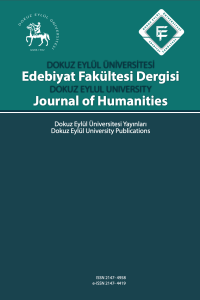Öz
George Orwell'ın 1984 adlı romanı çeşitli teorik perspektiflerden yorumlanmış olsa da, anlatı hâlâ tartışmaların yeni yörüngelerini araştırma fırsatını ortaya koyar. Eser özellikle Erich Fromm'un teorik görüşleri ışığında bir okuma için yeterli alan sağlamaktadır. Erich Fromm, sadizm, mazoşizm ve özgürlük krizinin öne çıkan özellikleri olduğu modern topluma yönelik eleştirileriyle tanınır. Fromm'a göre, Rönesans'tan bu yana modern bireyler, özgürlüğü elde etme çabaları nedeniyle kendilerini psikolojik bir yalnızlık, güçsüzlük ve anlamsızlık durumunun içinde bulmuşlardır. Geleneksel değerleri ve dini inancı geride bırakmak onlara tatmin olabilecekleri bir özgürlük sağlamamış; daha ziyade modern dönem öncesi değerlerin eksikliği, onların acizlik duygusunu bastırma arayışına girmelerine neden olmuştur. Bu nedenle Büyük Birader gibi sadist diktatörler, kitleleri ezerek acizlik duygusunu telafi etmek isterken, kitleler acizliğin göstergesi olarak diktatörlük otoritesine körü körüne teslim olup mazoşistleşiyorlar. Roman, kaybetme ve boşluk duyguları nedeniyle tahakküm kurma ve tahakküm altına alınma eylemlerinin yaygınlaştığı modern toplumda sadizm ve mazoşizmin birbirini sürdürmeyi nasıl beslediğine dair örnekler bulma olanağı sunmaktadır.
Anahtar Kelimeler
Kaynakça
- Dobson, J. E., & Fisher, P. F. (2007). The Panopticon’s Changing Geography. Geographical Review, 97(3), 307–323. http://www.jstor.org/stable/30034174
- Frodsham, J. D. (1984). The New Barbarians: Totalitarianism, Terror and the Left Intelligentsia in Orwell’s 1984. World Affairs, 147(3), 139–160. http://www.jstor.org/stable/20672021
- Fromm, E. (1963). Afterword on 1984. Orwell’s Nineteen Eighty-Four: Text, Sources, Criticism, ed. Irving Home. New York: Harcourt, Brace & World, Inc., pp. 204-210.
- Fromm, E. (1965). Escape From Freedom. New York: Avon Books.
- Fromm, E. (1986). For the Love of Life. Ed. Hans Jürgen Schultz. Trans. by Robert and Rita Kimber. New York: The Free Press.
- Fromm, E. (1956). The Art of Loving. New York: Harper and Row Publishers.
- Fromm, E. (1973). The Anatomy of Human Destructiveness. New York: Holt, Rinehart and Winston.
- Fromm, E. (2002). The Sane Society. London and New York: Routledge.
- Ingle, S. (2010). Nineteen Eighty-Four Promotes the Values of the Common People. In Dedria Bryfonski (Ed.), The Abuse of Power in George Orwell’s Nineteen Eighty-Four (pp. 115-128). Detroit: Greenhaven Press.
- Lisboa, M. M. (2011). The End of the World: Apocalypse and its Aftermath in Western Culture (1st ed.). Open Book Publishers.
- McLaughlin, N. (2021). Erich Fromm and Global Public Sociology. Bristol University Press.
- Orwell, G. (1949). Nineteen Eighty-Four. New York: Harcourt, Brace & World, Inc.
- Thompson, M. J. (2020). Erich Fromm and The Ontology of Social Relation. Kieran Durkin and Joan Braune (Eds.), Erich Fromm’s Critical Theory: Hope, Humanism, and the Future (pp. 23-42). London, New York, Oxford, New Delhi, Sydney: Bloomsbury Academic.
Öz
Although George Orwell’s 1984 has been interpreted from a variety of theoretical perspectives, the narrative still reveals an opportunity to inquire into novel trajectories of arguments. It provides enough room for a reading especially in light of Erich Fromm’s theoretical views. Erich Fromm is well-known for his criticism of modern society in which sadism, masochism and the crisis of freedom are outstanding features. For Fromm, since the Renaissance, modern individuals have found themselves entangled in a psychological state of loneliness, powerlessness and meaninglessness owing to their attempt to obtain freedom. Leaving behind traditional values and religious faith has not afforded them any freedom that they can be satisfied with; rather, lack of pre-modern values has caused them to embark on a quest for suppression of a feeling of impotence. That’s why, sadist dictators like Big Brother desire to make up for a sense of insignificance by oppressing the masses while the masses become masochists by submitting blindly to his dictatorial authority as an indication of impotence. The novel offers the possibility of finding examples regarding how sadism and masochism foster the maintenance of each other in modern society in which acts of dominating and being dominated are commonly observed due to feelings of loss and emptiness.
Anahtar Kelimeler
Kaynakça
- Dobson, J. E., & Fisher, P. F. (2007). The Panopticon’s Changing Geography. Geographical Review, 97(3), 307–323. http://www.jstor.org/stable/30034174
- Frodsham, J. D. (1984). The New Barbarians: Totalitarianism, Terror and the Left Intelligentsia in Orwell’s 1984. World Affairs, 147(3), 139–160. http://www.jstor.org/stable/20672021
- Fromm, E. (1963). Afterword on 1984. Orwell’s Nineteen Eighty-Four: Text, Sources, Criticism, ed. Irving Home. New York: Harcourt, Brace & World, Inc., pp. 204-210.
- Fromm, E. (1965). Escape From Freedom. New York: Avon Books.
- Fromm, E. (1986). For the Love of Life. Ed. Hans Jürgen Schultz. Trans. by Robert and Rita Kimber. New York: The Free Press.
- Fromm, E. (1956). The Art of Loving. New York: Harper and Row Publishers.
- Fromm, E. (1973). The Anatomy of Human Destructiveness. New York: Holt, Rinehart and Winston.
- Fromm, E. (2002). The Sane Society. London and New York: Routledge.
- Ingle, S. (2010). Nineteen Eighty-Four Promotes the Values of the Common People. In Dedria Bryfonski (Ed.), The Abuse of Power in George Orwell’s Nineteen Eighty-Four (pp. 115-128). Detroit: Greenhaven Press.
- Lisboa, M. M. (2011). The End of the World: Apocalypse and its Aftermath in Western Culture (1st ed.). Open Book Publishers.
- McLaughlin, N. (2021). Erich Fromm and Global Public Sociology. Bristol University Press.
- Orwell, G. (1949). Nineteen Eighty-Four. New York: Harcourt, Brace & World, Inc.
- Thompson, M. J. (2020). Erich Fromm and The Ontology of Social Relation. Kieran Durkin and Joan Braune (Eds.), Erich Fromm’s Critical Theory: Hope, Humanism, and the Future (pp. 23-42). London, New York, Oxford, New Delhi, Sydney: Bloomsbury Academic.
Ayrıntılar
| Birincil Dil | İngilizce |
|---|---|
| Konular | İngiliz ve İrlanda Dili, Edebiyatı ve Kültürü |
| Bölüm | Makaleler |
| Yazarlar | |
| Erken Görünüm Tarihi | 17 Ekim 2024 |
| Yayımlanma Tarihi | 22 Ekim 2024 |
| Gönderilme Tarihi | 7 Mayıs 2024 |
| Kabul Tarihi | 12 Ağustos 2024 |
| Yayımlandığı Sayı | Yıl 2024 Cilt: 11 Sayı: 2 |

